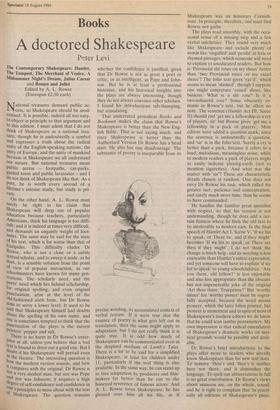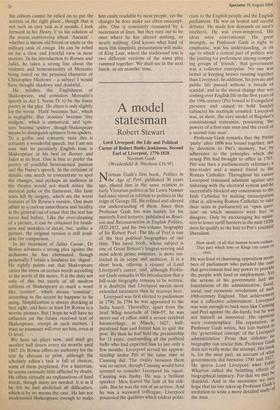Books
A doctored Shakespeare
Peter Levi
The Contemporary Shakespeare: Hamlet, The Tempest, The Merchant of Venice, A Midsummer Night's Dream, Julius Caesar and Romeo and Juliet Edited by A. L. Rowse (Eurospan £2.50 each)
National treasures demand public ac- cess, so Shakespeare should be mod- ernised. It is possible, indeed all too easy, to object in principle to that argument and to this edition. I must admit that I do not think of Shakespeare as a national trea- sure, though he is undoubtedly a symbol and expresses a truth about the radical unity of the English-speaking nations, the unity of Europe, and the unity of mankind because in Shakespeare we all understand our nature. But national treasures mean Public access — footpaths, car-parks, guided tours and public lavatories — and I do not think of Shakespeare like that. As a Poet, he is worth every second of a lifetime's intense study, but study is pri- vate.
On the other hand, A. L. Rowse must surely be right in his claim that Shakespeare will drop out of popular education because teachers, particularly Americans, think his language is too diffi- cult; and it is indeed at times very difficult, and demands an ungainly weight of foot- notes. The same may be said for the state of his text, which is far worse than that of Euripides. This difficulty eludes Dr Rowse, who is not a close or a subtle textual scholar, and to sweep it aside, as he does, is a sensible solution from the point of view of popular instruction, as our schoolmasters have known for many gen- erations. The scholarly need, and the Poets' need which lies behind scholarship, for original spelling, and even original punctuation; arise at the level of the 01d-fashioned sixth form, but Dr Rowse aims to serve a lower level. It used to be said that Shakespeare himself had doubts about the spelling of his own name, and "e is sometimes tempted to think that the Punctuation of the plays is the merest Printers' pepper and Salt.
There is no harm in Dr Rowse's enter- Prise at all, unless you believe that a bad text is bound to drive out a good one. But I doubt if his Shakespeare will prevail even in the theatre. The interesting question is
co.v the modern version sounds, and how it compares with the original. Dr Rowse is not a very modest man, but nor was Pope and nor was Johnson; it requires a high degree of self-confidence and confidence in °Ile's principles to mess about with the text °f Shakespeare. The question remains
whether the confidence is justified, given that Dr Rowse is not as great a poet or critic, or as intelligent, as Pope and John- son. But he is at least a professional historian, and his historical insights into the plays are always interesting, though they do not always convince other scholars. I found his introductions tub-thumping, but stimulating.
That underrated periodical Books and Bookmen makes the claim that Rowse's Shakespeare is better than the New Eng- lish Bible. That is not saying much, and since Shakespeare is better than the Authorised Version Dr Rowse has a head start. He also has one disadvantage. The substance of poetry is inseparable from its precise wording, its accumulated context of verbal texture. If it were true that the essence of poetry is what gets left out in translation, then the same might apply to adaptation; but I do not really think it is quite true. It is odd how much of Shakespeare can be communicated even in the despised medium of Lamb's Tales. There is a lot to be said for a simplified Shakespeare, at least for children under 11, particularly if the real thing is also available. In the same way, he can stand up to free adaptation by producers and film- makers far better than he can to the honeyed reverence of famous actors. And A. L. Rowse loves Shakespeare; he has gloated over him all his life, as if
Shakespeare was an honorary Cornish- man. In principle, therefore, one must find Rowse not guilty.
The plays read smoothly, with the occa- sional sense of a missing step and a few verbal infelicities. They sound very much like Shakespeare, and include plenty of words like 'ungalled' and 'perdie' in lyric or rhymed passages, which someone will need to explain to uneducated readers. But how is 'Provincial slit roses on my shoes' better than 'two Provincial roses on my razed shoes'? The folio text gives `rac'd', which seems to mean 'slashed', though I suppose one might conjecture 'raised' shoes, like buskins. What is a slit rose? Is it a two-coloured rose? Some obscurity re- mains in Rowse's text, but he offers no note. The sentence (Hamlet Act III, Scene II) should end 'get me a fellowship in a cry of players, sir' but Rowse gives 'get me a fellowship in a pack of players'. Most editors have added a question mark, since the sentence is undoubtedly a question, and 'sir' is in the folio text. Surely a cry is better than a pack, because it refers to a loud, melodious, meaningless noise, while to modern readers a pack of players might as easily indicate playing-cards (not to mention cigarettes). And what was the matter with 'sir'? These are characteristic details chosen at random. One does not envy Dr Rowse his task, which called for greater tact, patience and concentration, and surely much more time, than he seems to have commanded.
He handles the familiar great speeches with respect, so that his version is not undemanding, though he does add a cer- tain flatness where he feels the old text to be intolerable to modern ears. In the final speech of Hamlet Act I, Scene V, 'If we list to speak, or There be, and if they might' becomes 'If we list to speak, or There are then if they might'. I do not think the change is much help, and its wording is less enjoyable than Hamlet's satiric expression; and yet someone will have to explain 'if we list to speak' to young schoolchildren. 'Are you there, old fellow'?' is less enjoyable and also less appropriate than the obscure but not impenetrable joke of the original 'Art thou there, Truepenny?' But 'worthy Miner' for 'worthy pioner' must be regret- fully accepted, because the word means pioneer, which the later folios printed, but pioneer is unmetrical and. in spite of most of Shakespeare's modern editors we do know that he could scan iambic pentameters. My own impression is that radical emendation of Shakespeare's dramatic works on met- rical grounds would be possible and desir- able.
Dr Rowse's brief introductions to the plays offer more to readers who already know Shakespeare than his new text does. To remove 'thou's and 'thee's is neither here nor there, and it diminishes the language. To spell out abbreviations in full is no great contribution. Dr Rowse's views about scansion are, on the whole, sound, and he is right to complain that 'in practi- cally all editions of Shakespeare's plays,
the editors cannot be relied on to put the accents in the right place', though that is not such an easy task as it sounds. I look forward in his Henry V to his solution of the recent controversy about 'Ancient' whether it means old friend or uncle or the military rank of ensign. He can be relied on for a clear and forceful view in most matters. In his introduction to Romeo and Juliet, he takes a strong line about the violence and homosexuality of Mercutio being based on the personal character of Christopher Marlowe — a subject I would have thought shadowy and doubtful.
He relishes the Englishness of Shakespeare, and considers Mercutio's speech in Act I, Scene IV to be the finest poetry in the play. He alters it only slightly for the worse. 'Hath' becomes 'has', which is negligible. But 'atomies' become 'tiny midgets'. which is unmetrical, and 'spin- ners' become 'spiders', though Shakespeare means to distinguish spinners from spiders. To a gothic and romantic taste this is certainly a wonderful speech, but I am not sure that its peculiarly English tone is Shakespeare at his best or Romeo and Juliet at its best. One is free to prefer the poetry of youthful heterosexual passion and the Nurse's speech. In the criticism of details, one needs to concentrate to spot the changes, and perhaps an audience in the theatre would not much notice the metrical jerks or the flatnesses, like faint scars left by surgery, which are the worst features of Dr Rowse's version. One must admit to a curious smoothness and lucidity in the general run of sense that the text has never had before. Like the over-cleaning of a picture, it can be criticised for brash- ness and mistakes of detail, but, unlike a picture, the original version is still avail- able for comparison.
In his treatment of Julius Caesar, Dr Rowse advances a strong plea against the archaisms he has eliminated, though personally I retain a fondness for 'digest'. He rightly points out that Shakespeare varies the stress on certain words according to the needs of the metre. It is the duty not only of this but surely of all modern editions of Shakespeare to mark a word like 'conster', which means 'construe', according to the accent he happens to be using. Simplification is always shocking at first sight, and here at least Dr Rowse is a worthy pioneer. But I hope he will have no influence on the future received text of Shakespeare, except in such matters. I trust no examiner will ever set him, even at O level.
We have six plays now, and shall get another half dozen every six months until 1987. Dr Rowse offers no authority for the text he chooses to print, although the scholarly editor's task is full of choices, some of them perplexed. For a historian, he seems curiously little afflicted by doubt. He offers virtually no explanations of hard words, though many are needed. It is as if he felt he had abolished all difficulties, which is by no means the case. He has not modernised Shakespeare enough to make
him easily readable by most people, yet the changes he does make are often unaccept- able. One is constantly reassured by a succession of lines, but they turn out to be ones where he has altered nothing, or nearly nothing. God knows what kind of mess this simplistic presentation will make of King Lear, where the traditional text is two different versions of the same play rammed together. We shall see in the next batch, in six months' time.







































 Previous page
Previous page